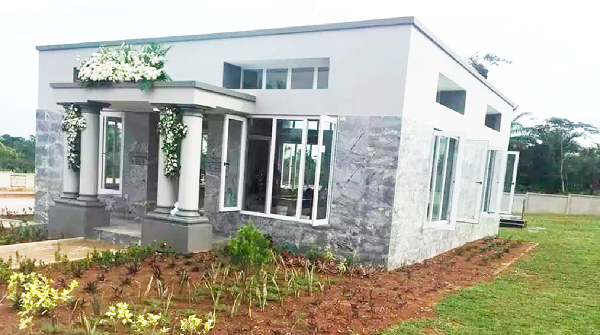
The dead who live in ‘Penthouses’
Even in death there are classes, and some cemetery gravestones reflect a class system for the dead.
If you travel across most parts of the country, you will stumble upon cemeteries in any town or village.
Advertisement

Some are fortunate to be buried in self-contained houses at the cemetery.
They are often located in the most picturesque part of the town beneath giant trees and shrub plants that give the cemeteries some shade. This to some extent shows how in death some people are still ahead of their contemporaries.
Indeed, this really defeats the popular saying that we will all end up being buried six feet down, whether rich or poor.
In Accra for instance, almost all the cemeteries are full and as a result, some people are even buried on top of others. Obviously, it is no more six feet.

The resting place of Justice Johnson Boateng Siriboe, a retired Supreme Court Judge
Currently, some smart entrepreneurs are putting up private cemeteries that cost an arm and a leg.
An example is the Gethsemane Memorial Garden, an elegantly manicured lawn cemetery situated in the up market neighbourhood of Shiashie, East Legon in Accra.

A staircase leading to a gravestone with a statute of the deceased by it
Here, it is largely the rich and famous who are blessed to be buried there at thousands of cedis.
Death is considered a rite of passage for those who die at an acceptable (old) age. For those who believe in traditional religion, when death occurs, divination as to the cause of death is sought from dead ancestors, with death usually attributed to spiritual elements (witchcraft, offending one's ancestors or gods) rather than medical or physical reasons.

Furthermore, it is an African cultural belief that to be in the world of the dead confers on one supernatural powers over those in the world of the living, such as the ability to bless or curse, and to give or take life among others.
For many African traditions that believe in life after death, it is believed that when a person dies, he transcends into another realm which is not as physical as earth.
For them, death is not the end but the beginning or in some cases, continuation of life.

This explains why death in most African traditions is not viewed as a tragedy, but is rather celebrated with several rites of passage.
The traditional Africans believe that among the spirit forces are the wicked and benevolent ones.

Where one goes after death depends on the moral life of the person when he was on earth; and for one to enjoy the life of bliss in the next world, one must have the necessary characteristics and above all, be accorded a befitting burial.
This explains why various types of monuments are put up at the cemeteries to honour the dead for a life well lived.



